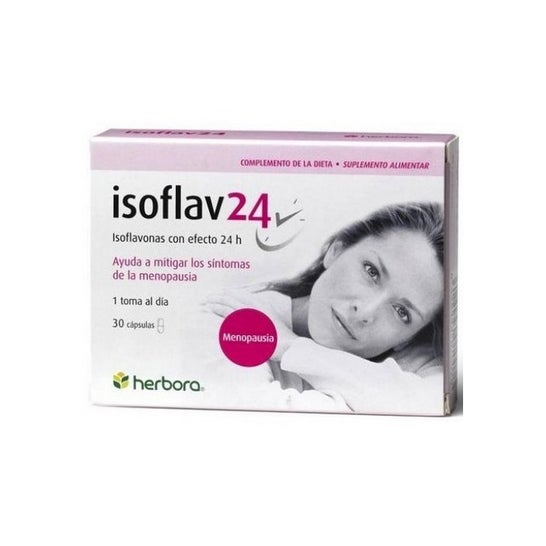Dietary supplement in vegetable pearl format, based on a concentrate of soy lecithin and vitamin D. Soy is rich in folic acid, vitamins B1 and B2, iron, phosphorus, magnesium, calcium, manganese and copper. It helps regulate bowel rhythm and relieve menopausal symptoms such as hot flashes, sudden mood swings, sweating and osteoporosis. Vitamin D acts as a modulator in the immune system and promotes bone and joint strength.
Bequisa Isoflabeq 99 180capsules
Log into your account and set up an alert to be notified when the product becomes available again.
Do you want us to notify you when it is available?
Soy lecithin and vitamin D special for menopausal women
Description
Instructions for use
Take 2 to 3 capsules a day.
Unit price
Pharmaceutical Advice
Iron is a functional mineral that contributes to the body's growth and development. It is present in haemoglobin and myoglobin. These proteins transport oxygen from the lungs to the rest of the organism. Iron is also involved in the creation of hormones and connective tissue.
Our organism absorbs this mineral from foods such as seafood, lean meat, eggs, pulses and nuts. To facilitate its absorption, it is advisable to add acidic foods rich in vitamin C, such as orange or lemon juice, to the diet. A lack of iron in the diet can cause iron deficiency (anaemia). In the long term, it can lead to symptoms such as a constant lack of energy, fatigue, intestinal disorders and/or difficulty keeping body temperature under control. Lack of iron can be restored through a varied diet. If this is not enough, it can be mitigated through supervised supplementation. It is essential to follow the advice of a healthcare professional and always avoid taking an iron dietary supplement without checking if you are deficient in this mineral.
The body's iron requirements will change throughout the years. It is particularly important to regulate it during the years of menstruation, as well as in pregnant women and infants. Iron is also actively involved in development and growth and is therefore very important for newborn babies.
Safety and product information
Safety visual aids
At this time we do not have safety images for this product, but we are working on it. We encourage you to check back later for updates. In the meantime, we recommend that you read the safety information that comes with the product before using it. If you have any questions about safety, please do not hesitate to contact us. Also, if you wish, you can also return the product by following our terms and conditions.
Manufacturer details
At the moment we do not have the manufacturer's details, but we are working to add them as soon as possible. We invite you to check back later for updates. If you have any questions, please do not hesitate to contact us, we will be happy to help you.
RELATED SEARCHES ABOUT Menopause and Menstruation
- Digestion
- Insomnia
- Cold and Flu
- Blood Circulation
- Cholesterol and Triglycerides
- Cystitis
- Lives and Gallbladder Cleanse
- Tiredness and Fatigue
- Gases and Flatulence
- Kidney Stones
New in Natural Remedies
- Herbensurina Probiotic 30comp
- Sanon Aceite De Ajo 180caps
- Actúa Garganta gominolas sabor limón 24 uds
- Em-Eukal Espinheiro Maritimo Rebuçados Tosse Sem Açúcar 75g
- Em-Eukal Anis & Funcho Rebuçados Tosse Sem Açúcar 75g
- Natnatura Circulation Balance 90 cápsulas
- DocMorris NAC N-acetilcisteína 600mg 60comp
- DocMorris Magnesio Malato 825mg 120 Comp
- Arkopharma Arkocápsulas Cimicífuga 60caps
- Cumlaude Lab Serotogyn Nocta 2x30caps


